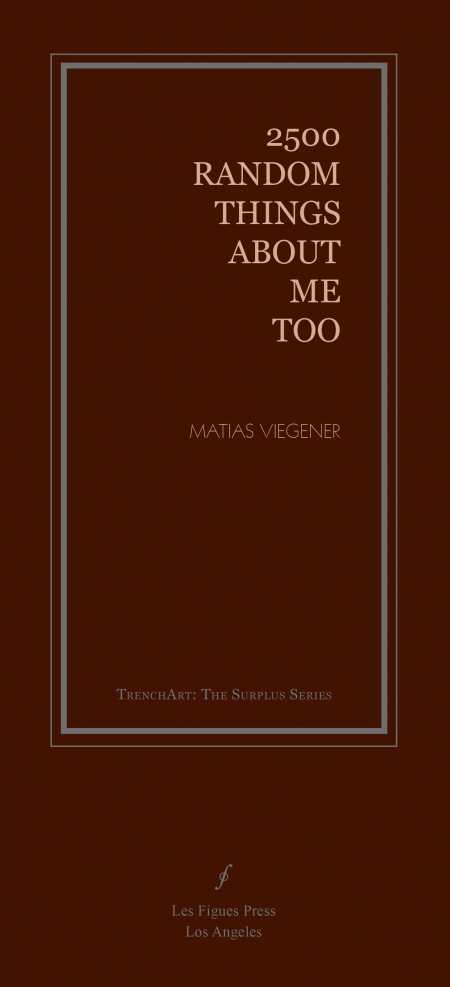2500 Random Things About Me
The sheer number of lists that are featured in popular magazines and websites speaks to a cultural fascination with the enumeration (and often, qualification) of all sorts of things—twenty ways to balance your budget, the top ten foreign films of 2010, etc. Lists have become prevalent in the realm of social media as well, particularly on Facebook. Users are often subject to pleas from friends to list their top 10 favorite books or 15 albums that changed your life. In 2500 Random Things About Me Too, Matias Viegener explores the nature of the Facebook list and its potential (or lack thereof) to tell a story.
Viegener’s book, as the title suggests, consists of exactly twenty-five hundred listed items, divided by twenty-five into one hundred chapters. The items that comprise these lists are memories, observations, questions, factual statements, and abstract sentences seemingly devoid of context. Much of Viegener’s writing in these lists deals with the nature of the lists themselves. Self-reflexivity abounds, and the reader, who naturally looks for a narrative pattern, is constantly tripped up in an enjoyable way by Viegener’s refusal to adhere to a narrative structure, as in the following two items: “There’s nothing very random about these lists. I edit them, though, to seem random,” and “They are randomesque.”
While Viegener’s book has its predecessors in list-driven memoirs like Joe Brainard’s I Remember, Viegener refuses to grant his book the status of memoir. Every item in every list was initially written as a status update on Viegener’s Facebook account, and at a certain point they were collected by scrolling in reverse and grouped into lists of twenty-five items. Viegener is every bit as interested in writing about the process of list-making as he is writing about his own experiences, and many of the items fall somewhere in between—aphoristic items about the act of list-making. He constantly references and evaluates his own list-making in a process that initially was close to real-time.
This isn’t simply an academic exercise, however. Many of the items in the lists have a poetic charge to them and are extremely evocative, while others more matter-of-factly give the reader an insight into Viegener’s character. Still others gleefully engage in a sense of inspired silliness, as in the following list examples: “I wrote ganderous instead of dangerous. But I already fixed it,” and “I need to make this really boring and pedantic to drive people away.”
2500 Random Things is published by Les Figues Press, which specializes in conceptual writing, which is to say writing where the idea behind the work is at least as interesting or important as the writing itself. Viegener’s book definitely falls into the area of conceptual writing, but unlike much of that genre, it is fun and touching as well as thought-provoking. The list format of the book seems to demand a linear narrative, but again, Viegener does his best to subvert the narrative structure by referring to the process of list-making itself. The result is a book that consistently foils the reader’s expectations and that, paradoxically, gives a very evocative, often poignant, insight into the author’s life while simultaneously being a meditation on what it means to enumerate one’s memories.
Reviewed by
Daniel Coffey
Disclosure: This article is not an endorsement, but a review. The publisher of this book provided free copies of the book to have their book reviewed by a professional reviewer. No fee was paid by the publisher for this review. Foreword Reviews only recommends books that we love. Foreword Magazine, Inc. is disclosing this in accordance with the Federal Trade Commission’s 16 CFR, Part 255.

